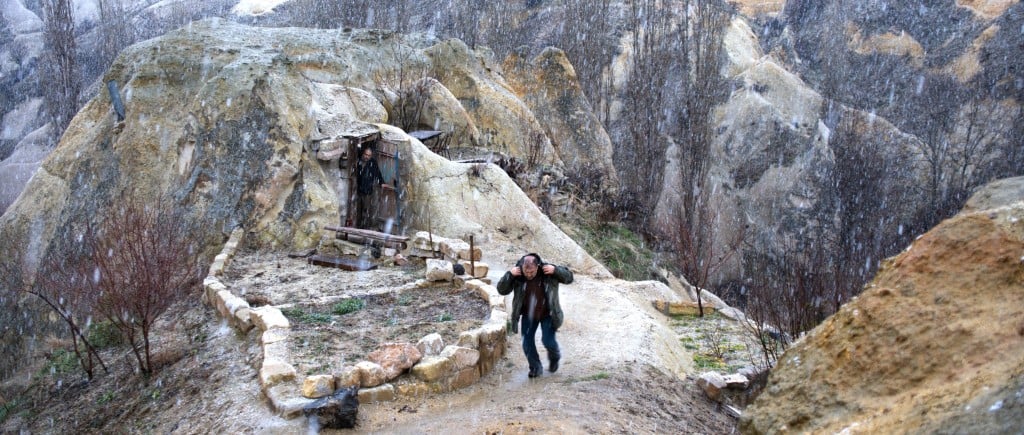Cannes gives Golden Palm to ‘Winter Sleep’
Xavier Dolan takes bronze, and Julianne Moore wins best actress for Cronenberg’s ‘Maps to the Stars’
Scene from ‘Winter Sleep’
Share

Once again the Cannes Film Festival has given world cinema’s most coveted trophy to a film with a running time of more than three hours. A jury headed by director Jane Campion awarded Turkish auteur Nuri Bilge Ceylan the Palme d’Or for Winter Sleep, an epic tale of relationships unravelling in an Anatolian inn. (Last year the Palme went to another relationship marathon, Blue is the Warmest Colour.) For cinephiles, Ceylan, 55, is one of the world’s most revered auteurs, but the only inaccessible thing about Winter Sleep is its length, as it unfolds with epic stretches of dialogue, punctuated with breathtaking glimpses of an otherworldly landscape where houses are etched from caves and cliffs. Ceylan dedicated his award to the young protesters in Turkey who “have sacrificed their lives to protect our future.”
The awards ended a frenzy of speculation that Quebec’s Xavier Dolan might become the first Canadian, and the youngest filmmaker, to win the Palme d’Or in the 67-year history of the Cannes festival. As it turned out, the 25-year-old Dolan took bronze in the Olympics of world cinema, winning the third-place Jury Prize for Mommy, his fourth feature. The jury split the prize between his film and Jean-Luc Godard’s 3D reverie, Goodbye to Language, ingeniously joining at the hip the youngest and oldest contenders among the 18 filmmakers in competition—the godfather of the old New Wave and the hope for its future.
Godard did not show up for the prize, or for the award. But Dolan made the most of his moment at the podium by delivering a tearful speech that was full of passion and idealism it’s hard to imagine what would have happened had he actually won the Palme.
Canadian cinema scored another victory as Julianne Moore won best actress for her virtuosic performance as a distraught Hollywood actress in David Cronenberg’s Maps to the Stars, but was not in Cannes to accept the award. With an unprecedented three Canadian features in competition, two won awards, while Atom Egoyan’s The Captive, which was massacred by critics, went unrecognized.
The second-place Grand Prix went to The Wonders, Alice Rohrwacher’s dreamlike tale of a family of beekeepers. Leviathan, an epic about a fat, corrupt, drunken politician (who inevitably reminded Toronto critics of Rob Ford) took best screenplay. Best director went to Bennett Miller for Foxcatcher, the most obvious Oscar contender in the competition: it’s based on the true story of psycho tycoon John Dupont sponsoring a pair of U.S. Olympic gold-medallist wreslters, Mark Schultz and his older brother David Schultz, before murdering David. The best actor prize honoured another biopic, with Timothy Spall winning for his performance as landscape painter J.M.W. Turner in Mike Leigh’s Mr. Turner. After a lifetime of “being a bridesmaid,” Spall expressed relief that he was finally a bride, then proceeded to give what may be the longest, most shambolic acceptance speech on record, as he fumbled with his smartphone to find his script, then rambled about his 33-year-old partnership with Leigh, while going on at length that he was lucky not to be dead after surviving cancer.
But Xavier Dolan’s inspirational speech was clearly the emotional heart of the ceremony, as he seized the opportunity to speak out for a generation. With his voice breaking and tears in his eyes, he turned to Campion, the first female director to win the Palme d’Or (for The Piano) and said, “The Piano is the first film I watched when I asked my stepmother at 16, ‘What should I watch?’ Your Piano made me want to write roles for women, beautiful women with soul and will and strength, not victims, not objects. I’m still young—but a word for my generation. Some people who will dislike what you do, some will dislike who you are. But let’s hold onto our dreams because together we can change the world and changing the world takes time. Not just politicians and scientists can change it, but artists as well. Everything is possible for those who dare and dream and work.”
It was a speech clearly intended to live up to a Palme d’Or moment, if that was in the cards. After the ceremony, I asked Dolan how he kept his perspective with the buzz about him being favoured to win was hard to take. “It was hard, reading it everywhere, hearing it for everyone.” Did he feel mixed emotions when he realized in the same instant that winning one award meant losing another? “Of course. I would be coy right now in giving any statement that I was disappointed. I’m filled with joy to know that a jury at all acknowledged the film.” As for sharing his award with Godard, Dolan didn’t seem to appreciate the symmetry of the gesture. “Well, I guess there’s a calculated statement behind that ex-aequo jury prize,” he said. But then he acknowledged that with the Cannes festival’s longtime patriarch, Gilles Jacob, finally stepping down, “we are at the twilight between two generations.”
“Are you a Godard fan?” I asked.
“No.”